| Davai |
| poema ad incastro |
| Periodo primo, Intuizione delle proporzioni |
| dal 28 aprile al 2 maggio 2004 |
| Periodo secondo, il volume delle cose |
| dal 20 giugno al 6 luglio 2004 |
| Periodo terzo, ritmi percepibili all'occhio |
| dal 7 all'11 luglio 2004 |
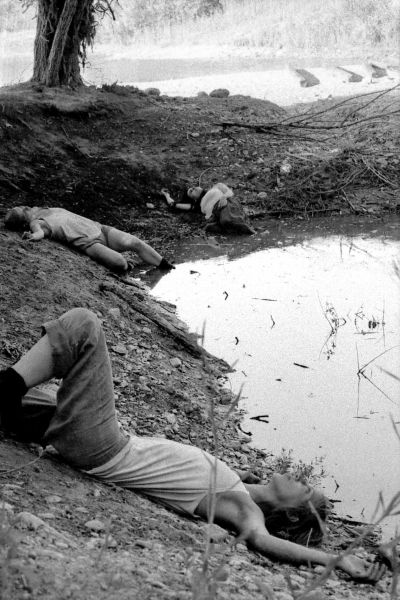
Fire or the abandonment
One of the major themes in ‘Andrej Rublev’ is that of leaving. The progressive lost of the artistic action as well as the constant changement, the mild resignation to the changement.
This is closely linked to the theme of the bell, the changement that creates the transformation from a liquid to a solid state, the bronze: when fire attacks an element, it does it by penetrating in its cracks, in its wounds.
And then it destroys it and turns it to dust.
In this sense, fire is what brings along abandonment and makes force turn into weakness since, as Tarkovskij says in Stalker, ‘weakness is power and power is nothing’.
It is abandonment which seems to create the energy necessary for acting. It is the awareness of the uselessness of power and the vitality of weakness that makes our constant and ineffable acting alive.
Which is the relation among the fight of men, their resistance and theatre?
Instinct, necessity and life
Both Rublev and Boris follow their instinct of survival. In Davai, Masque Teatro discovers a particular truth by learning how a bell gets created and fused, how a blacksmith works, how bronze should be treated.
Davai (Go! - in Russian) stems from the collaboration between ‘Masque Teatro’ and Santarcangelo dei Teatri as well as from their common wish to create a project able to overcome the physical limits of theatre in order to make the thought of the company concrete.
The project is divided into three stages. The first stage started in April with a workshop for actors that took place in the company artistic seat in Forlì (The perception of the proportions) then went on in Santarcangelo with another workshop (The volume of things) end ended with a public performance (Rhythms that can be perceived by the eye) to which the actors attending the different workshops took part.
The perception of the proportions
April 28th,29th,30th,- May 1st,2nd - ‘Actor foundryman’ workshop
This workshop took place in the company seat, which was previously arranged for it. The workshop lasted five days and 20 actors – professional and not - took part in it. On this occasion, they stayed in a house in the country placed at their disposal by Masque Teatro. The house was called ‘LA FORNACE’. There the fusion and working of iron occurred.
The volume of things
July from 1st to 6th Santarcangelo - Workshop
The workshop took place in Santarcangelo in the open quarry, near the Marecchia river. According to the project, a group of new actors should have joined the performance a few days after the first performance. The workshop lasted six days and 20 actors took part in it. They were the ‘element unconnected with the situation’, like an exterior and suspicious eye, necessary for the project. After six days, they were inserted as the coral element in the performance.
Rhythms that can be perceived by the eye
July 7th,8th,9th,10th,11th Santarcangelo - Performances
The staging began on June 20th in Santarcangelo. The works were carried on in two places at the same time: Piazza Garganelli, a large place where THE FOUNDRYMAN HUT and THE QUERRY ON THE MARECCHIA RIVER were built. This huge place was, in its turn, divided into three smaller places: the grove - a little island connected to the land from one side – the foundry – a large place inside the quarry that was turned into the bell foundry – and the beach – a strip of land in front of the lake behind the foundry.
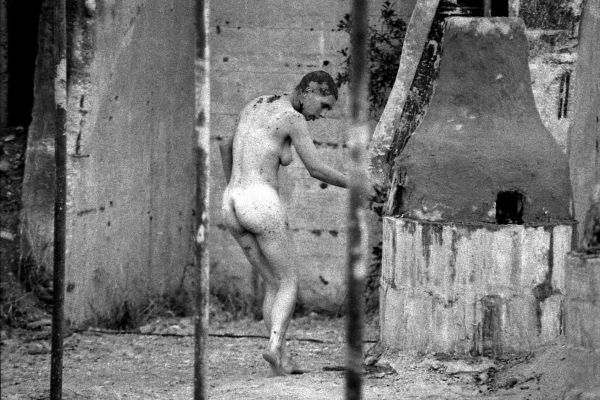
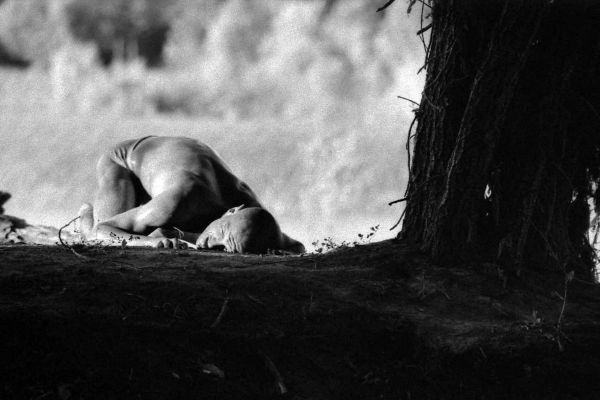
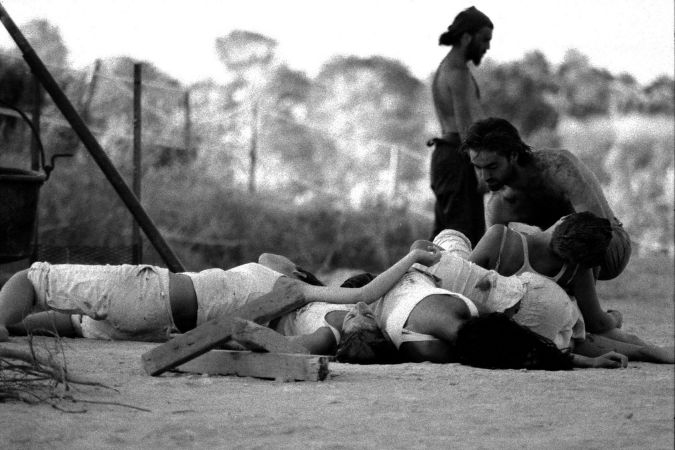
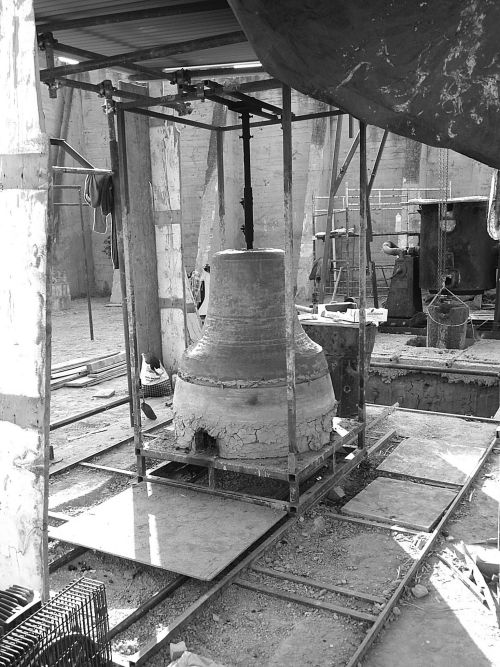
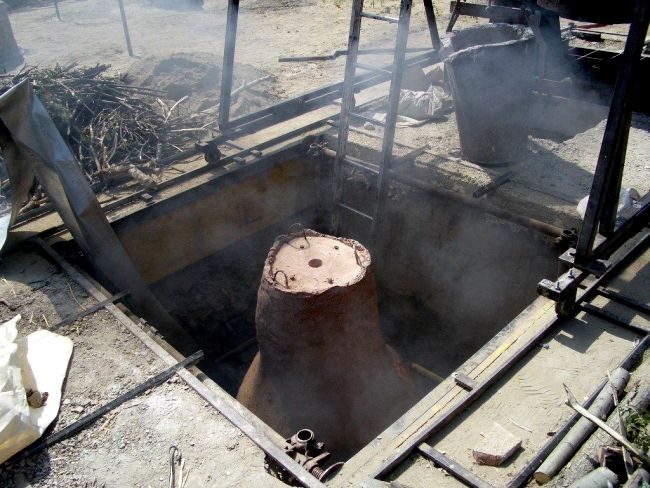
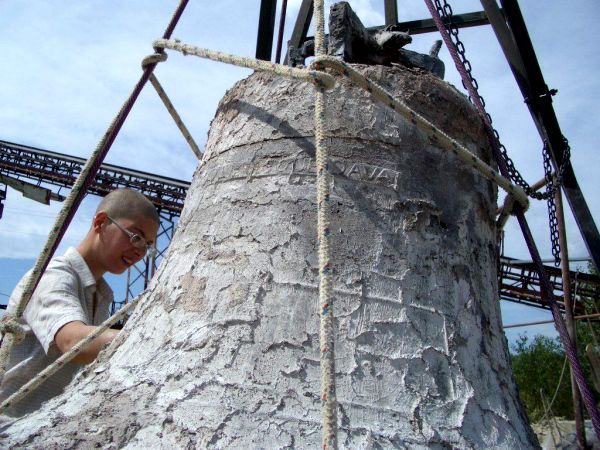
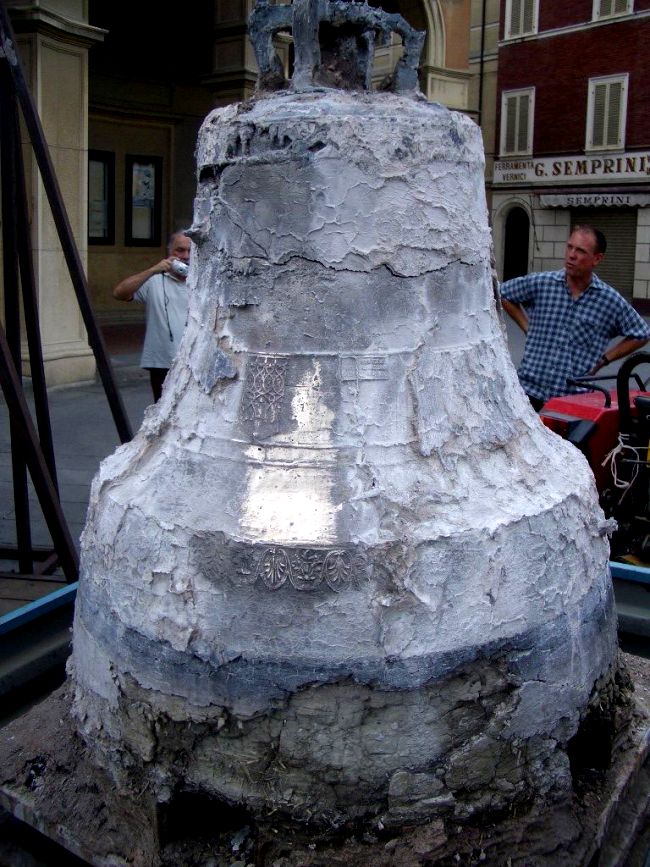
|
actors/foundrymen |
Catia Gatelli,
Eleonora Sedioli, Lorenzo Bazzocchi, Andrea Basti, Eugenio Debegnac,
Massimo Fraternali, Olivier Caumont, Lia Pari, Claudia Angrisani,
Federica Cangini, Paolo Carbone, Mario Cossu, Eva Geati, Giordano
Giorgi, Benedetta Guidi, Mauro Masini, Tihana Maravic, Daniela Macello,
Claudia Roselli, Manuela Savioli, Alessandro Scarano, Vincenzo Schino,
Elisa Andreani, Gabriella Artini, Valerio Bonanni, Caterina Cidda,
Pasquale De Marzo, Annina Di Oronzo, Marco Di Stefano, Debora Fioravalle,
Tomas Kutinjac, Andrea Labozzetta, Elisa Lazzerini, Livia Lupatelli, Maia Pedulla’, Marco Perfetto, Giovanni
Scacchetti, Giorgia Sinicorni, Agnese Verdelli
|
|
| Fonderia di campane | foundry of bells, conception: |
Lorenzo Bazzocchi |
|
caster: |
Massimo Fraternali, Studio d’arte M8, Sassocorvaro | |
assistants caster: |
Giordano Giorgi, Alessandro Scarano | |
fusion assistants: |
Mario Cossu, Andrea Basti, Paolo Carbone, Olivier Caumont, Giordano Giorgi, Alessandro Scarano, Mauro Masini, Vincenzo Schino | |
foundry construction: |
Catia Gatelli,
Eleonora Sedioli, Lorenzo Bazzocchi, Andrea Basti, Eugenio DeBegnak,
Claudia Angrisani, Federica Cangini, Paolo Carbone, Mario Cossu, Eva
Geati, Giordano Giorgi, Olivier Caumont, Benedetta Guidi, Mauro Masini,
Tihana Maravic, Claudia Roselli, Alessandro Scarano, Vincenzo Schino
|
|
| Baracca del fonditore | Caster’s shack, |
Catia Gatelli,
Eleonora Sedioli, Lorenzo Bazzocchi, Andrea Basti, Eugenio DeBegnak,
Claudia Angrisani, Federica Cangini, Paolo Carbone, Mario Cossu, Eva
Geati, Giordano Giorgi, Benedetta Guidi, Mauro Masini, Tihana Maravic,
Claudia Roselli, Alessandro Scarano, Vincenzo Schino
|
costructions inside Masque seat: |
Eleonora Sedioli,
Lorenzo Bazzocchi, Catia Gatelli, Andrea Basti, Daniela Marcello,
Vincenzo Schino
|
|
| Manuela Savioli, Lia Pari | ||
| icona | ||
Sound engineers: |
Mirko Fabbri, Raffaele Bassetti | |
Light designer and Technicians |
Istituto Bildungsmarkt e.V., Vulkan gGmbH, Berlino: Gerd Bruck e a Burghard Achtenberg del Bildungsmarkt e.V. - Vulkan gGmbH di Berlino, istituto di formazione professionale per “event technicians” : Nicole Boehlke, Steffen Dudas, Stefan Foerster, Johannes Gierth, Sven Gloeditzsch, Tobias Grause, Andreas Kasek, Oleg Neumann, Hagen Runkewitz, Carsten Schindler, Thomas Schmidt, Lukacz Tatara, Nathalie Westphal, Maxim Astor, Monique Kruemmel, Christian Fischer, Tina Westland; cuochi: Olesa Durneva, Natalya Gucenko, Benjamin Heyde; assistenti: Ingo Wolf, Jonas Grigoleit . |
|
Scene customs: |
Mood Indigo, Bologna | |
Organization: |
Catia Gatelli - assistenti Maria Concetta Mercuri, Claudia Roselli, Alessandro Scarano | |
| consulenze,collaborazioni | Fonderia Morri, San Marino - Fratelli Acquarelli, rottami di ferro,Campiano, Ravenna - Sesto Guidi, rottami metallici, Forlì - Massimo Sassi, Roberto Cambi, Fonderia Franco Fabi - Forlì, Marinelli Pontificia Fonderia di Campane - Agnone, Betti, attrezzature per panifici e pasticcerie, Forlì | |
Photography: |
Federica Giorgetti | |